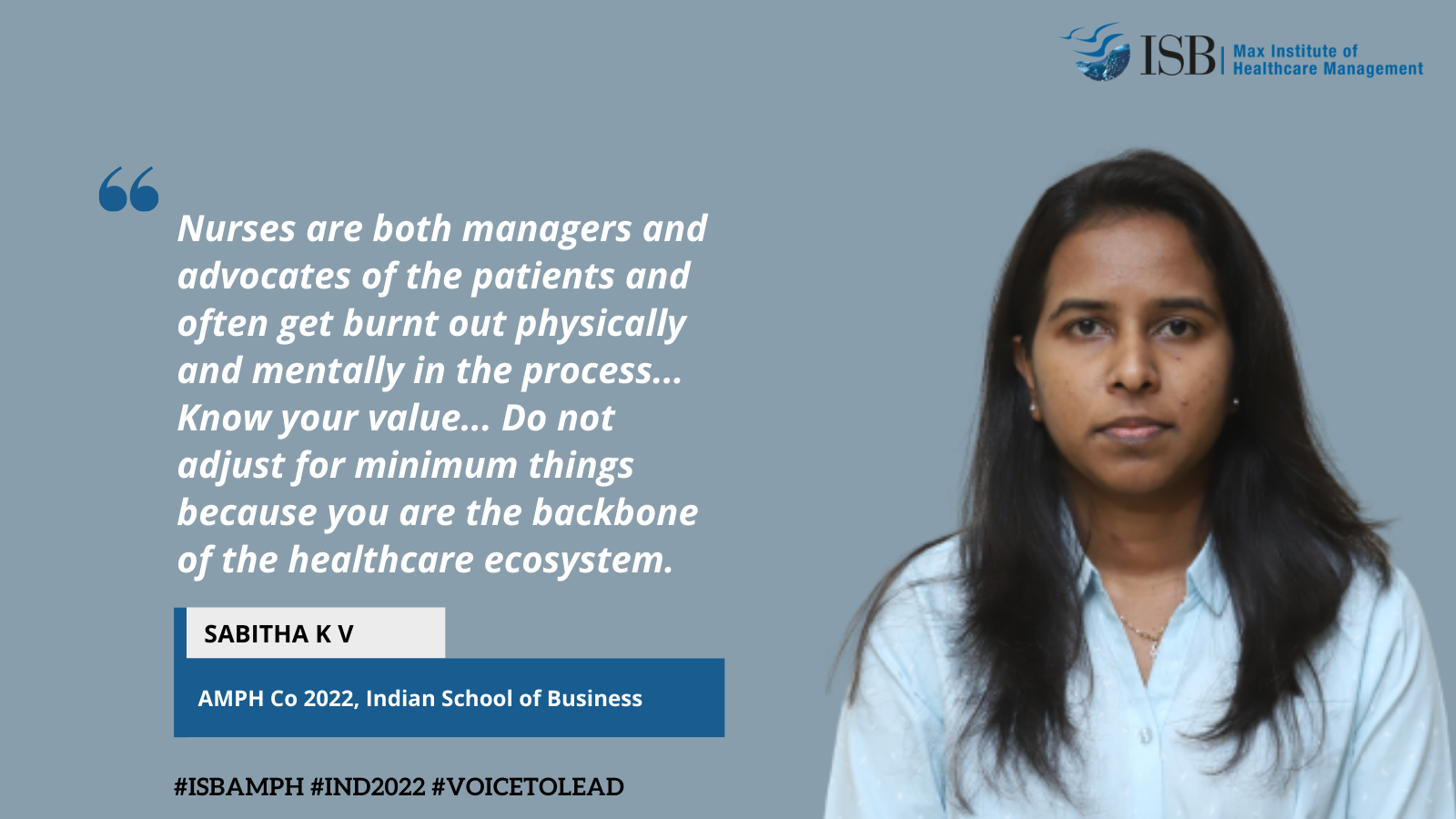
While India hailed its doctors and nurses as Covid warriors for their selfless and tireless efforts to serve humanity, the past two years also highlighted the shortage of nurses in the country. Nurses are the unflinching pillars on which the healthcare ecosystem rests. And yet, despite their undeniable role and contribution, they struggle with low wages and bear the burden of care with minimal support and dignity.
On the occasion of International Nurses’ Day, we spoke to Sabitha K V who is currently pursuing the Advanced Management Programme for Healthcare (AMPH) at ISB and trace her journey from nursing to management and beyond.
Sabitha hails from Kerala and completed her BSc in Nursing in 2010. Immediately after her graduation, she had planned to go to the UK but fate had different plans. Instead, she completed MSc in Psychology and cleared a government exam in 2014 to work as a Nursing Officer at a medical school.
In the 10 years of her nursing career, Sabitha saw how the industry changed. She worked in different capabilities in the hospital’s regional cancer centre, ICUs, and infection control ward and worked with the nurses training and contact-tracing teams. Despite such diverse experiences, she constantly felt something lacking. Once she started collaborating with a friend on a local healthcare initiative, she saw a difference in the working pattern since this friend came from a corporate hospital. Together, they did two projects in Andhra Pradesh and one in Kerala.
“This experience was a revelation! Once I started collaborating with my friends, I realised there were certain things that I could have done better. Although I knew the clinical side, I needed to know the non-clinical and managerial side as well for greater impact,” says Sabitha.
This was also the time when many friends and colleagues around her were moving from the health industry to healthcare management. Sabitha got intrigued and started looking for programmes that would not require full-time commitment as leaving her job was out of the question. Talking about her vision behind entering management education after a decade of nursing experience, she says, “I want to do something for society. That would only be possible if I know how to get the maximum out of the minimum. All services need to be provided at a reasonable rate in government hospitals. If I can understand how the healthcare business works, I can help treat the patients in a better way while also making money.”
She adds, “I have observed at my hospital that despite giving out generous packages at affordable rates, patients do not turn up for treatment. I want to understand what the missing link is and how can I fix this.”
Talking about her year so far at ISB, Sabitha shares, “AMPH has given me a glimpse in the various facets of the healthcare industry, ranging from HCIT, finance, economics, marketing, and so much more. I am humbled by the amount of learning I am having alongside a diverse set of peers. The insights I have derived from the subjects have recalibrated the way I think about healthcare now. Halfway into the programme and my friends have already started telling me that I speak like a manager now!”
While Sabitha is already on her journey to become a manager and transform her career in nursing, she is also set on the goal of creating more value for nurses in India. Talking about the pain points of this industry, she says, “Nurses are not valued in India. Indian nurses working abroad have a better life and that is why so many of them move overseas. It is high time that India recognises the contribution of nurses. If not, whatever enough motive they must cater to patients’ needs will be affected. Nurses work under extreme pressure and are both managers and advocates of the patients. They often get burnt out physically and mentally in the process and truly deserve more value as the critical link between the doctors and patients. It is high time we talk about the rights, safety, and wellbeing of nurses for strengthened and holistic healthcare systems.”
Before signing off, Sabitha shares an important message for fellow nurses, “During Covid, nurses were the only ones who would work continuously for six to eight hours in a PPE kit inside the ward. You almost always end up doing work that is not categorised for you. Know your value and do your job happily as you always do. Try to find the motivation to help each other and move ahead. And most importantly, do not adjust for minimum things because you are the backbone of the healthcare ecosystem.”

